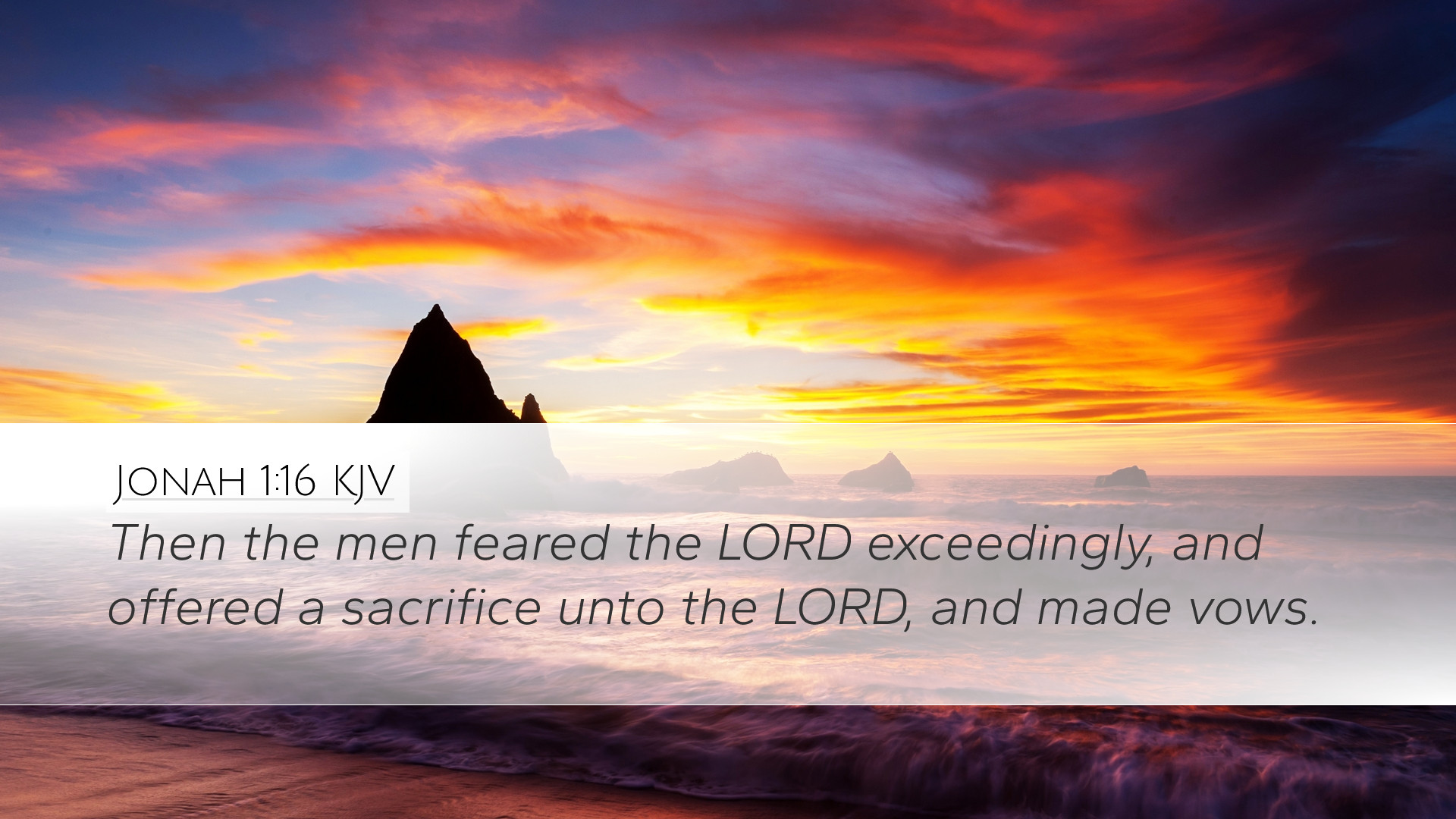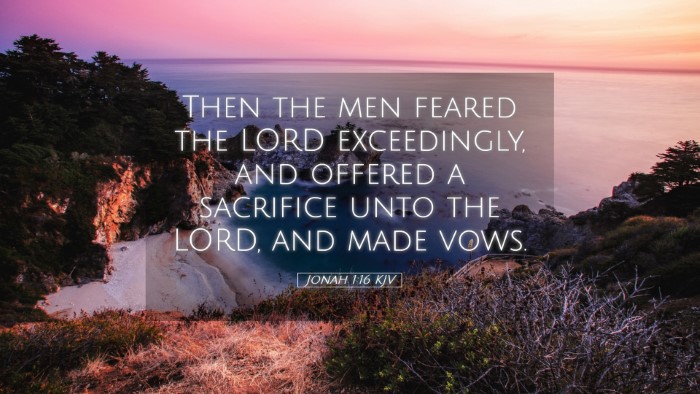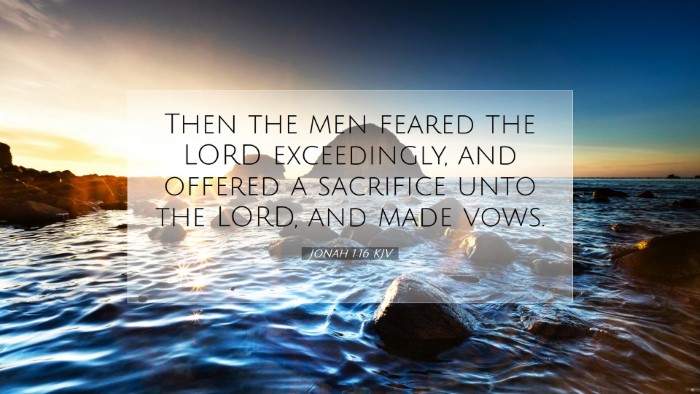Old Testament
Genesis Exodus Leviticus Numbers Deuteronomy Joshua Judges Ruth 1 Samuel 2 Samuel 1 Kings 2 Kings 1 Chronicles 2 Chronicles Ezra Nehemiah Esther Job Psalms Proverbs Ecclesiastes Song of Solomon Isaiah Jeremiah Lamentations Ezekiel Daniel Hosea Joel Amos Obadiah Jonah Micah Nahum Habakkuk Zephaniah Haggai Zechariah MalachiJonah 1:16
Jonah 1:16 KJV
Then the men feared the LORD exceedingly, and offered a sacrifice unto the LORD, and made vows.
Jonah 1:16 Bible Commentary
Bible Commentary on Jonah 1:16
Jonah 1:16 states: "Then the men feared the LORD exceedingly, and offered a sacrifice unto the LORD, and made vows." This verse encapsulates a crucial turning point in the narrative of Jonah, highlighting themes of fear, reverence, and the response to divine revelation.
Contextual Overview
The book of Jonah, a narrative prophetic work, offers profound insights into God's compassion and the nature of prophetic obedience. Jonah, chosen by God, is called to proclaim judgment upon Nineveh, yet he flees from his divinely appointed mission. This refusal results in a tempestuous storm as the ship he is on faces divine wrath.
The Fear of the Men
In this verse, the response of the sailors is pivotal. Prior to this moment, they were described as pagans, calling upon their gods in desperation. However, after casting lots and identifying Jonah as the cause of the storm, they experienced a significant shift in perspective.
- Matthew Henry notes that the sailors' fear was not merely a temporal dread but a profound reverence for the true God. Their fear was “exceeding,” indicating a realization of the God’s greatness in contrast to their previous beliefs.
- Albert Barnes remarks that this fear led to an immediate acknowledgment of Yahweh's sovereignty over nature. It is an example of how God can use even the rebellious actions of His prophets to reveal Himself to others.
- Adam Clarke emphasizes that this moment is a critical revelation of God’s global interest in humanity. The sailors, who came from pagan backgrounds, demonstrate that divine truth can penetrate the hearts of those outside the covenant community.
Offering Sacrifices and Making Vows
The sailors' immediate response to their fear was to offer sacrifices and make vows to the LORD. This act signifies two important elements of their conversion experience:
- Recognition of God’s Authority: The sacrifices were acts of worship, acknowledging Yahweh’s power and authority over the storm and their lives. This aligns with the biblical principle that true worship is a response to God's revelation and intervention.
- Commitment to a New Path: Making vows indicates their commitment to follow after the true God. This vow of fidelity demonstrates a conversion experience, moving from darkness to light, from ignorance to faith.
The Implications for Theological Reflection
This event in Jonah raises profound theological implications regarding the nature of God, human responsibility, and the dynamics of faith:
- God’s Sovereignty: The sovereignty of God is evident throughout the book of Jonah. He orchestrates the storm, uses a fish to save Jonah, and ultimately leads to the repentance of the Ninevites. God's control over creation is a theme emphasized by all commentators.
- The Inclusivity of God’s Grace: The sailors' conversion highlights the inclusive nature of God’s grace. It suggests that God reaches out beyond Israel to bring all nations into a relationship with Him—a theme prevalent in the New Testament as well.
- Human Response to Divine Revelation: This verse serves as a reminder that when confronted with the truth of God’s involvement in their lives, the appropriate response is reverential fear and worship. The initial fear of the storm transforms into a fear of the LORD, indicating a movement from terror to trust.
Lessons for Pastors and Theologians
Pastors and theologians can draw significant lessons from Jonah 1:16 that are applicable to contemporary ministry:
- Revival Among Non-Believers: The conversion of the sailors reminds us that genuine encounters with God can occur outside traditional boundaries. Pastoral ministries should remain open to the work of the Holy Spirit among all groups of people and in all contexts.
- Encouragement for Obedience: Jonah’s initial disobedience stands in stark contrast to the immediate, albeit unexpected, obedience of the sailors. This serves as a call for congregations to reflect on their own responses to God’s calling and the importance of living lives that bear testimony to His truth.
- Worship as a Response: Worship is presented as a natural response to God’s revelation. Pastors should encourage congregants to cultivate an attitude of worship both in personal lives and corporate gatherings, particularly as they are reminded of God’s mighty works.
Conclusion
In summary, Jonah 1:16 encapsulates a powerful moment of transformation, illustrating how even those outside the covenant community can come to acknowledge the LORD. The fear of the sailors translates into worship and commitment, revealing significant theological truths about God’s nature and His pursuit of humanity. This commentary, drawing from esteemed public domain sources, highlights the multifaceted implications of this verse for understanding God’s sovereignty, grace, and the nature of true worship.


